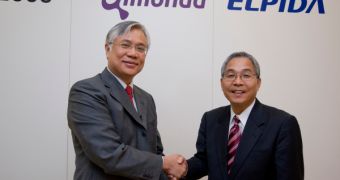Tokyo, Japan-based Elpida Memory has announced today that it has reached an agreement with the Germany-based Qimonda AG memory vendor to acquire Qimonda technology licenses and a part of the company's design assets, related to the Graphics Double Data Rate (GDDR), a memory architecture specifically developed for graphics applications. With the announcement, Elpida Memory is making its first steps into the market for graphics memory, expanding its portfolio to a wider range of products and services.
“Graphics systems now need graphics buffer memory with a data transfer rate of more than 5-Gigabit/sec given the rapidly growing popularity of high-definition format graphics data, 3D graphics and various display formats,” said Takao Adachi, Elpida's chief technology officer.
“In response to this need we will shortly begin commercial production of GDDR5, for which an even faster data transfer rate of 8-Gigabit/sec may be feasible in the near future. To achieve such high speeds advanced technologies for I/O signal transmission as well as internal high speed circuits are crucial. The important GDDR technologies we have acquired can now contribute not only to Elpida's graphics memory development but also to the improvement of our overall DRAM design technologies.” he added.
Elpida said that it planned to ramp up a GDDR line of products, with shipments of 1-Gigabit GDDR3 and 1-Gigabit GDDR5 parts expected to begin in the first half of 2010. Both these products are expected to be outsourced to Winbond Electonics Corporation, a Taiwan-based company that has been working with and is experienced in Qimonda's process technology. Taking advantage of the development work done by its team of engineers working in Germany and Japan, the memory company is planning to begin mass production of 2-Gigabit GDDR5 in the second half of 2010, at its Hiroshima Plant.
Elpida's debut in the graphics memory business is largely related to the financial issues that have affected Germany-based memory chip maker Qimonda, which is currently in insolvency proceedings.

 14 DAY TRIAL //
14 DAY TRIAL //